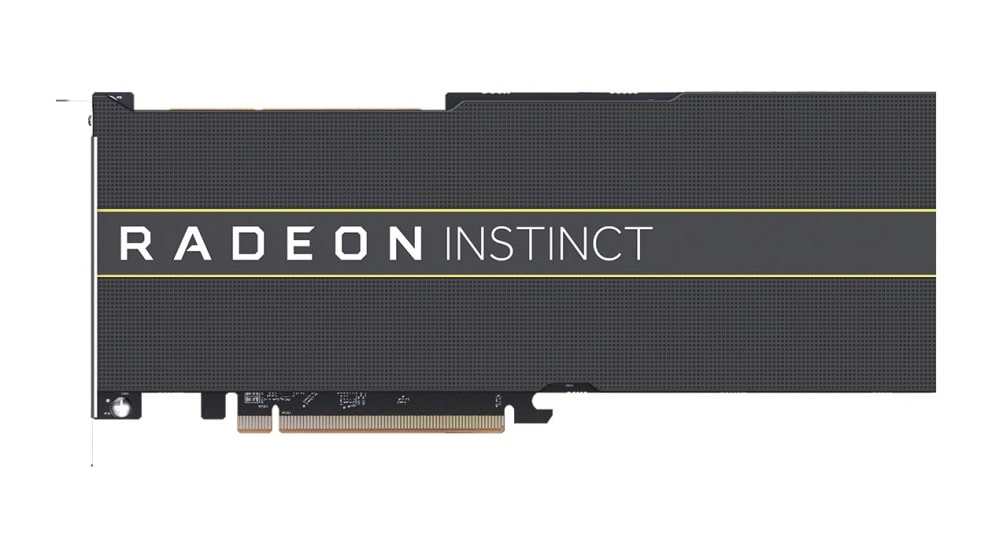![]() Today AMD announced what it calls the world’s first 7nm data center GPUs, the AMD Radeon Instinct MI60 and MI50 accelerators. The new Radeon Instinct accelerators are designed to deliver enough compute performance for next-generation deep learning, HPC, cloud computing and rendering applications and can be leveraged in use cases such as large-scale simulations, climate change, computational biology, disease prevention and more. AMD also updated its ROCm Open Software Platform.
Today AMD announced what it calls the world’s first 7nm data center GPUs, the AMD Radeon Instinct MI60 and MI50 accelerators. The new Radeon Instinct accelerators are designed to deliver enough compute performance for next-generation deep learning, HPC, cloud computing and rendering applications and can be leveraged in use cases such as large-scale simulations, climate change, computational biology, disease prevention and more. AMD also updated its ROCm Open Software Platform.
Today AMD announced what it calls the world’s first 7nm data center GPUs, the AMD Radeon Instinct MI60 and MI50 accelerators. The new Radeon Instinct accelerators are designed to deliver enough compute performance for next-generation deep learning, HPC, cloud computing and rendering applications and can be leveraged in use cases such as large-scale simulations, climate change, computational biology, disease prevention and more. AMD also updated its ROCm Open Software Platform.

Graphic demands are constantly evolving and data centers need to keep up. AMD’s new Radeon Instinct MI60 and MI50 accelerators are ready to address workloads such as HPC and deep learning through their flexible mixed-precision capabilities, powered by high-performance compute units. The new accelerators are designed to deliver higher levels of floating-point performance and greater efficiencies. From a performance perspective, they new GPUs leverage HBM2 with up to 1TB/s memory bandwidth speeds and support for PCIe 4.0 interconnect.
Key features include:
- Optimized Deep Learning Operations: Provides flexible mixed-precision FP16, FP32 and INT4/INT8 capabilities to meet growing demand for dynamic and ever-changing workloads, from training complex neural networks to running inference against those trained networks.
- World’s Fastest Double Precision PCIe Accelerator: The AMD Radeon Instinct MI60 is the world’s fastest double precision PCIe 4.0 capable accelerator, delivering up to 7.4 TFLOPS peak FP64 performance allowing scientists and researchers to more efficiently process HPC applications across a range of industries including life sciences, energy, finance, automotive, aerospace, academics, government, defense and more. The AMD Radeon Instinct MI50 delivers up to 6.7 TFLOPS FP64 peak performance, while providing an efficient, cost-effective solution for a variety of deep learning workloads, as well as enabling high reuse in Virtual Desktop Infrastructure (VDI), Desktop-as-a-Service (DaaS) and cloud environments.
- Up to 6X Faster Data Transfer: Two Infinity Fabric Links per GPU deliver up to 200 GB/s of peer-to-peer bandwidth – up to 6X faster than PCIe 3.0 alone – and enable the connection of up to 4 GPUs in a hive ring configuration (2 hives in 8 GPU servers).
- Ultra-Fast HBM2 Memory: The AMD Radeon Instinct MI60 provides 32GB of HBM2 Error-correcting code (ECC) memory, and the Radeon Instinct MI50 provides 16GB of HBM2 ECC memory. Both GPUs provide full-chip ECC and Reliability, Accessibility and Serviceability (RAS) technologies, which are critical to deliver more accurate compute results for large-scale HPC deployments.
- Secure Virtualized Workload Support: AMD MxGPU Technology, the industry’s only hardware-based GPU virtualization solution, which is based on the industry-standard SR-IOV (Single Root I/O Virtualization) technology, makes it difficult for hackers to attack at the hardware level, helping provide security for virtualized cloud deployments.
AMD has updated its ROCm open software platform to version 2.0. The latest version is designed to speed development of high-performance, energy-efficient heterogeneous computing systems. The new version supports the new Radeon Instinct accelerators as well as providing updated math libraries for the new DLOPS; support for 64-bit Linux operating systems including CentOS, RHEL and Ubuntu; optimizations of existing components; and support for the latest versions of the most popular deep learning frameworks, including TensorFlow 1.11, PyTorch (Caffe2) and others.
Availability
The MI60 and ROCm 2.0 are expected to be available by the end of the year while the MI50 is expected to be ready by the first quarter of next year.
Sign up for the StorageReview newsletter

